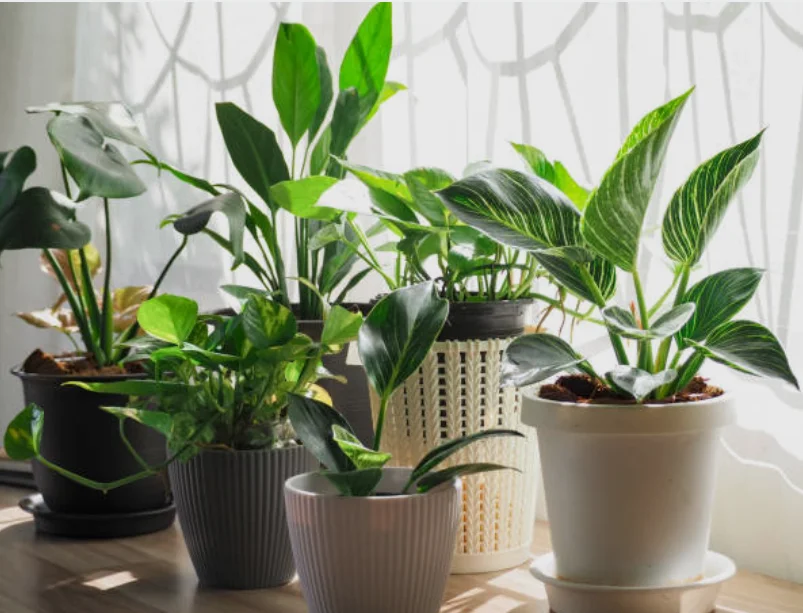In the hustle and bustle of our daily lives, we often forget about the quality of the air we breathe indoors. With the rising pollution levels, it’s crucial to create a healthier environment in our homes.Incorporating air-purifying plants into your home decor is a simple and effective way to achieve both goals.
In this guide, we’ll explore some of the best indoor plants for cleaner air and along with essential tips and tools for successful indoor gardening.
Why Choose Air-Purifying Plants?
Indoor air can often be more polluted than outdoor air due to various factors such as chemicals from household cleaners, off-gassing from furniture, and poor ventilation. Air-purifying plants act as natural air filters, absorbing harmful toxins and releasing oxygen, thereby improving indoor air quality. Plus, they add a vibrant and refreshing ambiance to any room.

Essential Tools for Indoor Gardening
Pots and Planters: Choose containers with drainage holes to prevent waterlogged soil and root rot.
Potting Soil: Use a specially formulated mix of well drained potting soil for indoor plants.
Watering Can or Spray Bottle: Keep your indoor plants hydrated with regular watering, but avoid overwatering to prevent root rot.
Pruning Shears: Trim away dead or yellowing leaves to encourage healthy growth and airflow.

Best Indoor Plants for Cleaner Air
Snake Plant (Sansevieria trifasciata): Known for its ability to thrive in low light conditions, the snake plant is an excellent choice for beginners. It releases oxygen at night while purifying the air by removing toxins like formaldehyde and benzene.

Peace Lily (Spathiphyllum): With its elegant white blooms and lush foliage, the peace lily is not only visually appealing but also a powerful air purifier. It effectively removes common indoor pollutants such as ammonia, formaldehyde, and xylene.

Spider Plant (Chlorophytum comosum): Ideal for hanging baskets, spider plants are resilient and easy to care for. They are particularly effective at removing formaldehyde and xylene from the air, making them perfect for bedrooms and living areas.

Boston Fern (Nephrolepis exaltata): Known for its air-purifying properties, the Boston fern thrives in high humidity and indirect light. It removes pollutants like formaldehyde and xylene while adding a touch of lush greenery to your home.

Aloe Vera (Aloe barbadensis miller): Besides its medicinal properties, aloe vera also acts as an air purifier by removing toxins such as formaldehyde and benzene. It needs minimal care & thrives in bright, indirect sunlight.

Devil’s Ivy (Epipremnum aureum): Also known as pothos, devil’s ivy is a versatile and low-maintenance plant that excels at filtering indoor air pollutants.

Rubber Plant (Ficus elastica): With its large, glossy leaves, the rubber plant is an attractive addition to any room and helps purify the air by removing toxins like formaldehyde.

Bamboo Palm (Chamaedorea seifrizii): This tropical palm thrives in low light conditions and effectively removes formaldehyde, benzene, and trichloroethylene from indoor air.

English Ivy (Hedera helix): English ivy is not only a charming trailing plant but also an excellent air purifier, particularly for removing mold spores.

Chinese Evergreen (Aglaonema): This low-maintenance plant is well-suited for low light conditions and helps filter toxins like formaldehyde and benzene from the air.

Conclusion
Incorporating air-purifying plants into your indoor space not only adds beauty and greenery but also promotes cleaner, fresher air for you to breathe. With the right plants and care, you can enjoy the benefits of improved air quality and a healthier home environment.
Frequently Asked Questions (FAQs) about Best Indoor Plants for Cleaner Air
Do air-purifying plants require special care?
While air-purifying plants are generally low-maintenance, it’s essential to provide them with proper lighting, watering, and occasional pruning to ensure their health and effectiveness.
Which indoor plant purifies the air the most?
The snake plant purifies the air the most among indoor plants.
Do indoor plants purify air?
Yes, indoor plants purify air by removing toxins.
Which plant is best for indoor air quality?
The peace lily is best for indoor air quality.
What plant removes 78% of airborne mold?
The spider plant removes 78% of airborne mold.
What plant removes the most toxins?
The peace lily removes the most toxins among indoor plants.
Can I use artificial plants instead of real ones for air purification?
Artificial plants do not have the same air-purifying properties as real plants. It’s best to opt for living plants to reap the benefits of improved air quality.

